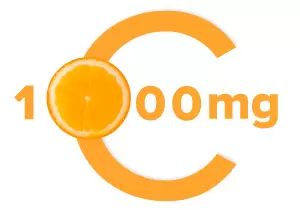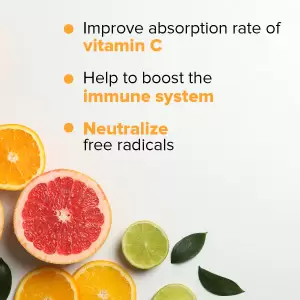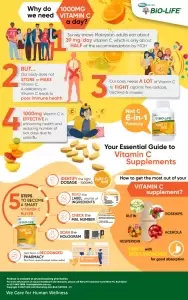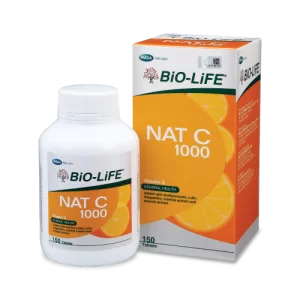
Vitamin C: How to get the most out of your supplement?
Aug 23, 2021
Introduction
The emergence of COVID-19 pandemic has raised public awareness on the importance of boosting the body’s immune system. One of the ways is by taking vitamin C supplementation daily. According to Malaysian Adults Nutrition Survey, vitamin C is one of the most commonly consumed supplements1 in Malaysia.
The question is, how to get the most out of your vitamin C supplement, without bringing harm to our body?
Most vitamin C supplements in the market offers a convenient once-a-day dosage of 1000mg, which is much higher than the Recommended Nutrient Intakes for Malaysia (RNI) of 70mg per day2. Supplements are not only catered for daily body maintenance; they are also formulated to provide additional health benefits to general consumers. For instance, to enhance health3 and to reduce the duration of common cold and cold incidence, we need to take high strength dose of 1000mg vitamin C4,5.

1000mg vitamin C is useful to cater for the reduced absorption rate in the body. Meaning, out of the 50% of vitamin C or 500mg that is absorbed in the body, only 200mg will stay in the blood stream6, and all the remaining will be excreted out in the form of urine. Hence, when taking vitamin C supplement, it is advised to be accompanied with adequate water intake to ease its excretion.
What are Bioflavonoids?
Bioflavonoids are substances that are typically found in certain plants, primarily in citrus fruits. For example, the white layer found under the skin of an orange contains bioflavonoids. Bioflavonoids have been known to be the best partner for vitamin C as these natural compounds would be able to improve the absorption rate of vitamin C by 35%9. Together with vitamin C, bioflavonoids could help to boost the immune system. Besides that, bioflavonoids are potent antioxidants that could neutralize free radicals.

Rest assured that the consumption of 1000mg vitamin C daily is safe and not toxic, if we follow the product label instruction. The accepted tolerable upper intake level (TUL) is 2000mg2 a day, which is set based on osmotic diarrhea and gastrointestinal disturbances7. In fact, the maximum level of vitamin C allowed by Malaysia National Pharmaceutical Regulatory Agency (NPRA) in adult health supplement is 1000mg8.
In conclusion, taking 1000mg of vitamin C supplement in a day is unlikely to cause any harm. If you struggle to get enough vitamin C from your diet, vitamin C supplement is a convenient way to fill the nutrition gap. Remember, do not take it above TUL, without prescription.

Check Out the Essential Guide to Vitamin C Supplements Fact Sheet!

Find out more about NAT C 1000mg.
References
- Mohd Zaki, N. A., Rasidi, M. N., Awaluddin, S. M., Hiong, T. G., Ismail, H., & Mohamad Nor, N. S. (2018). Prevalence and Characteristic of Dietary Supplement Users in Malaysia: Data From the Malaysian Adult Nutrition Survey (MANS) 2014. Global Journal of Health Science, 10(12), 127. https://doi.org/10.5539/gjhs.v10n12p127
- National Coordinating Committee on Food and Nutrition. RNI Recommended Nutrient Intakes for Malaysia. A Report of the Technical Working Group on Nutritional Guidelines.Ministry of Health Malaysia; Putrajaya, Malaysia: 2017
- Ordman, A. R. (2010). Vitamin C twice a day enhances health. Health, 02(08), 819–823. https://doi.org/10.4236/health.2010.28123
- Van Straten, M., & Josling, P. (2002). Preventing the common cold with a vitamin C supplement: A double-blind, placebo-controlled survey. Advances in Therapy, 19(3), 151–159. https://doi.org/10.1007/bf02850271
- Maggini, S., Beveridge, S., & Suter, M. (2012). A Combination of High-Dose Vitamin C plus Zinc for the Common Cold. Journal of International Medical Research, 40(1), 28–42. https://doi.org/10.1177/147323001204000104
- MOH Malaysia. Vitamin C: Apa yang perlu anda tahu? Retrieved 2021, July 7 from https://siraplimau.com/sayur-buah-tinggi-vitamin-c-suplemen/
- Institute of Medicine (US) Panel on Dietary Antioxidants and Related Compounds. Dietary Reference Intakes for Vitamin C, Vitamin E, Selenium, and Carotenoids. Washington (DC): National Academies Press (US); 2000. 5, Vitamin C. Available from: https://www.ncbi.nlm.nih.gov/books/NBK225480/
- National Pharmaceutical Regulatory Division. Drug Registration Guidance Document (DRGD).Ministry of Health Malaysia; Petaling Jaya, Malaysia: 2019
- Vinson, J. A., & Bose, P. (1988). Comparative bioavailability to humans of ascorbic acid alone or in a citrus extract. The American journal of clinical nutrition, 48(3), 601-604



